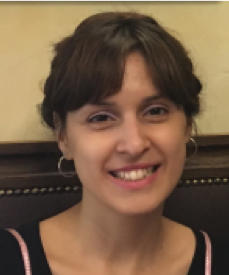Agnessa Karapetian

Neural Dynamics of Visual Cognition
PhD Candidate
Room JK 25/229
14195 Berlin
After completing a BSc in Psychology at McGill University in my hometown of Montréal, Canada, I joined the lab in January 2019 as a Master’s student while studying in the MSc Social, Cognitive and Affective Neuroscience program at FU. Afterwards, I completed a one-year internship in computational neuroscience, SmartStart, organized by the Bernstein Network, during which I was co-supervised by Prof. Cichy and Prof. Obermayer (TU Berlin).
In October 2020, I started my PhD in the lab, funded by the Einstein Center for Neurosciences until October 2023. I am also a student of the graduate school of the Bernstein Center for Computational Neuroscience. In my free time, I like to try to get away from the computer and focus on creative endeavours, such as painting, baking, and knitting. I also enjoy spending time in nature, especially for hiking (although it is nearly impossible to find a proper mountain around Berlin).
For more information, you can find my CV here:
General research interests
The general theme of my PhD is to investigate scene processing in the human visual cortex and in artificial networks. To achieve that, I use different neuroimaging methods (e.g., EEG) and computational techniques (MVPA, RSA, DNNs). I often collaborate on projects with scientists from other labs, such as Prof. Dr. Klaus Obermayer and Prof. Dr. Tim Kietzmann, as well as with other members of our group, including Kshitij Dwivedi and Johannes Singer.
Research projects
- Project 1: My first project is the continuation of the work I did during my SmartStart internship. It aims at determining at which points in time neural representations of scenes are actively involved in perceptual decision-making. We address this research question empirically, by correlating EEG and behavioural data from human experiments, and computationally, by modelling behavioural data with a recurrent DNN. In the empirical part, we relate EEG and human categorization reaction times and perform the distance-to-hyperplane analysis, an extension of signal detection theory. To answer the research question computationally, we extracted categorization reaction times from a recurrent DNN and performed the distance-to-hyperplane analysis with EEG data and network behavioural data.
- Project 2: For my second project, I will continue working on scene processing in humans and DNNs. I plan to collect neural (fMRI) and behavioural (reaction times, accuracy, error matrices) data from humans, feedforward and recurrent DNNs on two tasks of different difficulty levels to investigate the similarities and differences between humans and DNNs.
Student supervision & opportunities
During my Master’s, I was supervised by Dr. Polina Iamshchinina (former PhD student). I have previously co-supervised (with Kshitij Dwivedi) the Master’s thesis of Vanshika Bawa (University of Freiburg), and am currently supervising a BCCN rotation student, Muthukumar Pandaram. Although I am not currently looking for interns, feel free to get in touch if you are interested in any of the abovementioned topics.